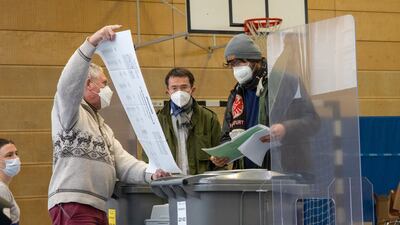With seven weeks to go until Germany chooses its next leader, security experts are on high alert for online meddling efforts that they fear could damage confidence in the poll.
Security services are tracking disinformation on the web after claims of Russian and Iranian interference cast a pall over elections elsewhere.
Officials fear that phishing attacks, which Iran is suspected of carrying out in Germany, could allow hackers to discredit candidates by leaking confidential material or sending fake messages from their accounts.
But experts say that foreign saboteurs are not the only threat to next month's election, with some false claims originating from fringe groups within Germany.
Some of these have sought to sow doubts about the electoral process, echoing the false claims of fraud which culminated in a deadly mob attack in the US.
While Germany’s pen-and-paper voting means that any cyberattacks are unlikely to alter the result, they could potentially hold up the count or, together with disinformation, trigger confusion about the process.
“The fear a couple of years ago that disinformation was used to actually sway individual votes — we haven’t seen that,” said Julian Jaursch, a digital policy expert at the New Responsibility Foundation (SNV) in Berlin.
“The threat that I see is a more general threat — it can be used to sow confusion and discord and make people mistrust each other and mistrust the process.”
September's election will be closely watched around the world as Europe’s biggest economy gets a new leader for the first time in 16 years. Angela Merkel’s successor as chancellor will have to navigate a series of foreign policy issues including relations with Russia and Iran.
The Alliance for Securing Democracy, a monitoring group, said Russia was the most influential player in stirring up controversy online.
Media outlets linked to Moscow have attacked the Green party candidate Annalena Baerbock, who wants to scrap a major gas pipeline to Russia. Accounts linked to Iran have focused on sanctions and nuclear talks.
Other Green candidates have been targeted by disinformation efforts which attributed fake quotations to them or targeted them with hate speech.
But the Greens were not the only victims, and any party or candidate could become the target of online meddling, said Mr Jaursch.
“It just depends on the topic that is popping up at the moment and the actors that are willing to act on it,” he said. “I think there’s heightened awareness compared to [the last election in] 2017. That’s a good thing.”

Phishing threat
German authorities have warned lawmakers to watch out for online scams and offered training on the subject to political parties.
Intelligence services are on guard after German Interior Minister Horst Seehofer promised to do “everything imaginable” to protect the election.
Hacking attempts have already been observed against politicians, which authorities believe could be an effort to leak real or fake material from their accounts.
“Personal information attained this way could be published in a selective or misleading way in order to discredit people and parties,” said Thomas Haldenwang, the head of a domestic intelligence agency, last month.
Attacks so far have largely been unsuccessful but “we definitely see the interest of certain states in exerting influence on this year’s parliamentary election,” he said.
Julia Schuetze, a cybersecurity expert at SNV, said authorities were more prepared than ever but that politicians and voters needed to do their part.
“In the end, parties themselves are responsible,” she said. “They should have enough awareness now and take their own measures.”
Facebook, which is under scrutiny for failing to stop disinformation on its platform, said it had a dedicated team working on the German election.
Anyone who wants to use the site to run a political advert in Germany must prove that they live there and reveal who paid for it, Facebook said.
Ms Schuetze said authorities had not revealed where possible threats came from, but that Russia would be one suspect after accusations of its interference elsewhere.
“It’s definitely a possibility that they’re trying to apply the same techniques in the German elections,” she said.
Within Germany, some false claims about election security have emerged from far-right circles linked to the Alternative for Germany (AfD) party.
Some AfD members allegedly spread disinformation about a state election in June at which the party was beaten by the centre-right Christian Democrats.
Conspiracy theorists linked to anti-lockdown protests were blamed by German authorities for a rising tide of extremism and anti-Semitism in the country.
“When it comes to disinformation, you have a ton more actors that are actually just domestic German individuals or groups,” said Mr Jaursch.
“That doesn’t necessarily have to come from Russia, that doesn’t necessarily have to come from Iran or China. That might as well just be fellow citizens.”


